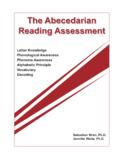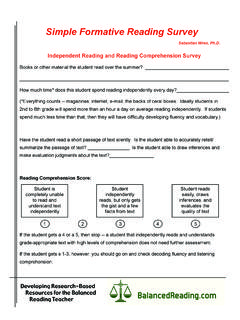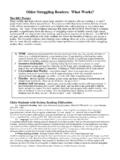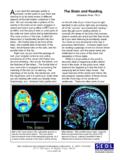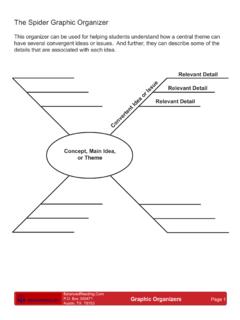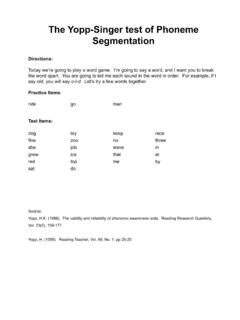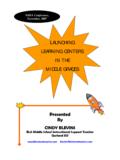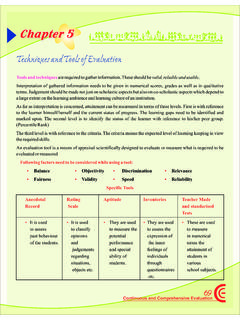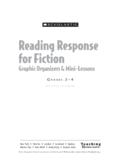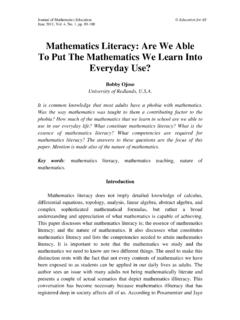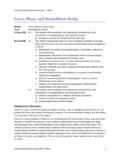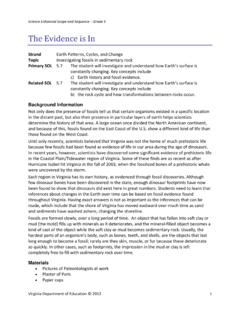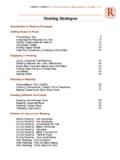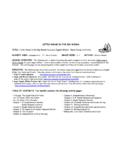Transcription of Descriptions of Early Reading Assessments
1 Descriptions of Early Reading Assessments Sebastian Wren, I t is important that teachers understand what is involved in learning to read. To help teachers understand the cognitive take some time to familiarize yourself with the framework now). This description of the various assessment techniques can be development that takes place in every used to help teachers to design their own emergent reader's head, SEDL has created classroom Assessments , and may help The Cognitive Foundations of Learning to teachers to better understand the district or Read: A Framework ( campus Assessments that are already Reading ). This framework describes in being used with their students.
2 Some detail the various cognitive domains that research has shown to be necessary I will begin with the top three elements for Reading acquisition, and it also on the framework, Reading shows how these cognitive domains Comprehension, Decoding, and are interrelated. Reading Language Comprehension. Then I will Comprehension describe the Assessments that can be In addition to understanding used for the various cognitive Language Decoding what is important for all children Comprehension domains that underlie Language learning to read, it is also very Comprehension. And last I will important that teachers Linguistic Cipher Lexical describe Assessments for the Knowledge Knowledge understand how to assess Knowledge cognitive domains that underlie ge led individual children's Decoding.
3 Now Alp Kno etic Let development in each of the Pho hab ter dK. wle Kno nem oun dge ogy cognitive domains Reading Comprehension ics tax wle Prin kgr eA. ant nol of t le Sy n described in the dge Bac war Sem Pho he cip ene framework. assessment Reading comprehension ss Concepts should always inform About Print is composed of two instruction. Individual equally important children come with such diverse components. decoding, or the ability to backgrounds and skills that it is necessary translate text into speech, is only part of the to cater their instruction to their individual process of Reading comprehension. The strengths. Ongoing assessment is other part is language comprehension, or necessary to discover each child's the ability to understand spoken language.
4 Individual literacy profile. All struggling readers have difficulty with either language comprehension or To assist teachers in their assessment of decoding or both. the Reading development of their students, I. will describe common approaches for Reading comprehension Assessments are assessment for each of the cognitive the most common type of published Reading domains outlined in SEDL's framework of test that is available. And the most typical Reading acquisition (so you may wish to type of Reading comprehension assessment The Southwest Educational Development Laboratory (800) 476-6861. 211 E. 7th Street Austin, Texas 78701. SEDL.)
5 Southwest Educational Development Laboratory involves asking a child to read a passage of them to read and follow simple instructions, text that is leveled appropriately for the such as, Stand up or, Go look out the child's age or grade, and then asking some window.. explicit, detailed questions about the content of the text (often these are called Reading comprehension should not be IRIs). There are some variations on confused with Reading accuracy, another Reading comprehension Assessments , very common form of Reading assessment . however. For example, instead of explicit In a Reading accuracy assessment , a child questions about facts directly presented in is asked to read a passage of text clearly, the text, the child could be asked to answer without making any mistakes.
6 The inferential questions about information mistakes that the child does make are which was implied by the text, or the child's analyzed to find clues about the child's comprehension might be tested by her decoding strategies (not comprehension ability to retell the story in the child's own strategies). Very often, an assessment words or to summarize the main idea or the combines these two different Assessments moral of the story. Another common into one assessment the child reads a Reading comprehension assessment is passage out loud while the teacher makes called a cloze task words are omitted note of errors the child makes (sometimes from the passage, and the child is asked to called a running record ), and then the fill in the blanks with appropriate words.
7 Child is asked some comprehension Also, young children's Reading questions about the passage. However, it comprehension can be assessed by asking is worth noting that a beginning reader's comprehension usually suffers when she is asked to read a passage of text out loud. When children read orally, they usually concentrate on Reading accurately, and do not pay as much attention to comprehension of the content. Oral Reading accuracy does give insights into decoding skills and strategies, but that is a separate test. A Reading comprehension test is most accurate if the child is not Reading aloud for an audience. Language Comprehension To read and understand text, a child needs to be able to understand language.
8 Before expecting a child to be able to read and understand a story, the question should be asked, Could the child understand this story if it was read to her? An essential aspect of language comprehension hinges on the ability to draw inferences and appreciate implications it is important to understand both the explicit and implicit messages contained in language. The Southwest Educational Development Laboratory Page 2. Because comprehension is what is being measured, language comprehension can be assessed in basically the same way Reading comprehension is assessed. With language comprehension assessment , however, the child should not be expected to read any text.
9 Everything from the instructions to the comprehension questions should be presented verbally to the child. It is also worth noting that a child's listening comprehension level is usually considerably higher than her Reading comprehension level. A child that is not able to read and understand a passage of leveled, grade-appropriate text usually has no difficulty understanding that same text if somebody else reads it to her. For most young children learning to read, their ability to read and understand text is limited by their decoding skills, not by their comprehension skills. (That is not to say that most children have good . comprehension skills or that comprehension skills are not a Reading the conventions of written English.)
10 For teacher's concern. The point here is that skilled readers, decoding is so automatic even when a child's comprehension skills that it requires virtually no conscious effort, are poor, their decoding skills are usually so the reader can devote full attention to worse.) However, sometimes teachers find the task of comprehending the text. that a child who can not read and understand a passage of text also does not As mentioned earlier, oral Reading understand it when the teacher reads it to accuracy ( running record ) is one the child. It is always worthwhile to form of decoding assessment , but it is not a compare a child's language comprehension very clean assessment .

